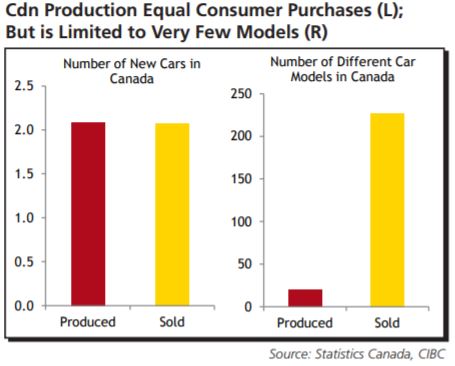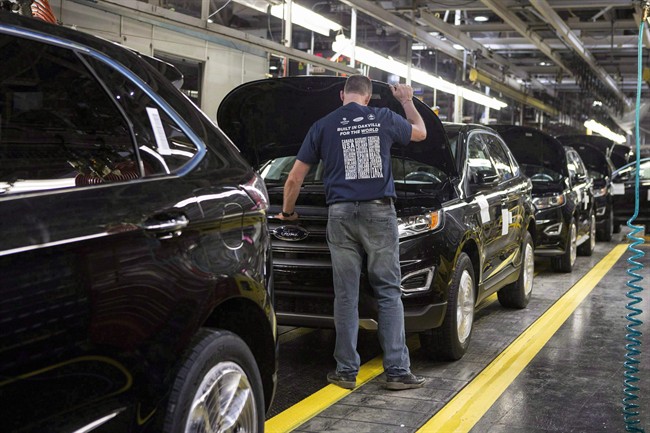As U.S. President Donald Trump mulls the idea of more tariffs, this time on automobiles, economists are warning that the amount of cars Canada produces could drop by 900,000 units a year.

That’s a significant amount — the International Organization of Motor Vehicle Manufacturers says Canada produces just over two million cars a year.
The 40 per cent drop would only happen if Trump enacts a 25 per cent tariff on Canada and no one else, according to economist Royce Mendes in a report from CIBC.
If the 25 per cent tariffs is applied to all foreign markets, Canada would stand to drop production by 400,000 units, the report says.
In the best case scenario, according to Mendes’ analysis, Trump would impose tariffs but offer Canada a temporary extension.
“That would actually boost US demand for all North American-made vehicles for as long as the exemption lasted,” Mendes writes.
The auto tariffs are expected to be the latest in a back-and-forth between Trump and the rest of the world. After enacting a 25 per cent tariff on steel and a 10 per cent tariff on aluminum, Canada hit the U.S. with retaliatory tariffs worth up to $16.9 billion. Trump has also laid into China with tariffs on $34 billion in goods, set to go into effect on Friday.
But Mendes warns that retaliatory auto tariffs might not be the best answer for Canadian consumers.

Get weekly money news
“It’s tempting to suggest that Canada could just raise its own tariffs and force Canadians to buy domestically-produced vehicles,” Medes wrote.
“But it has one major blind spot.”
While Canada produces and sells just over 2 million cars and commercial vehicles annually — seemingly an equal supply and demand — it’s the types of cars made in Canada that make it complicated.
In North America, for example, the Toyota RAV4 is made in Woodstock, Ont. The Toyota Highlander comes out of a facility in Princeton, Indiana.
“Canada only produces a handful of models relative to the hundreds of choices to which consumers have become accustomed,” Mendes writes.

The report says that Canadians aren’t loyal to Canadian-made cars either: roughly 10 per cent of Canadian purchases were produced in Canada, compared to the whopping 80 per cent of American purchases that were made in America.
It’s also important to note that a carmaker’s nationality has generally little to do with where a certain car model is manufactured. Most Canadians know that the big Detroit three — Ford, General Motors and Fiat-Chrysler — have manufacturing plants on both sides of the border. But so do Japanese giants like Toyota and Honda or South Korea’s Hyundai.
“Also, don’t forget that U.S.-made parts account for roughly 45 per cent of vehicles assembled in Canada,” Mendes said, explaining that less activity in Ontario car factories would ripple across the Great Lakes region.
“There are quite literally carloads of reasons not to raise tariffs, but that might not mean much,” Mendes said.
*with files from Erica Alini















Comments
Want to discuss? Please read our Commenting Policy first.